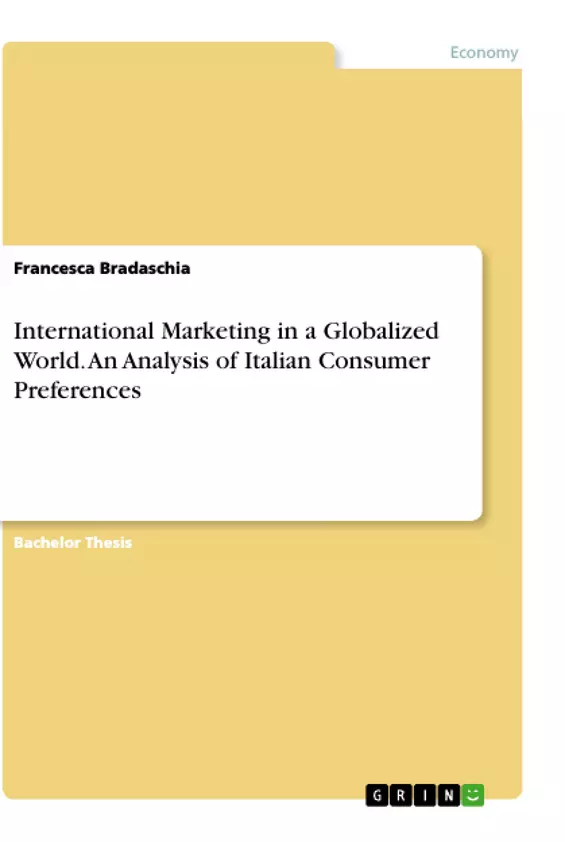During the last decades, globalization has altered world economies, societies, and cultures, and thus created a new dynamic reality. Today, companies and managers are continuously faced with the standardization versus localization controversy, and even though numerous studies and theories have been published, including Theodore Levitt's renowned "The Globalization of Markets", to date, no solution has been reached. Therefore, the purpose of this study is to determine the influence of Italy's representation in marketing campaigns and thus provide a framework for managers and marketers of international as well as Italian companies who wish to market and advertise their goods and services in Italy successfully.
Following the analysis of existing literature, to test the hypotheses that the greater the representation of the Italian culture and values, the higher the purchase likeliness and positive feelings associated with a campaign, an online-based survey was employed. Subsequently, the collected responses were analyzed utilizing the Wilcoxon Signed Ranked Test and the Kruskal-Wallis Statistical Test. The tested hypotheses were statistically significant, and an increase in both purchase likeliness, as well as positive feelings, was registered in marketing campaigns portraying the Italian culture. The results suggest that marketers and firms that decide to represent the Italian culture in their marketing campaigns and advertising and hence implement a localization strategy are more likely to increase advertisement appreciation along with sales. Though, having Covid-19 altered world balances, it is recommended to repeat the analysis at a distance of one year. Also, further research is essential in order to evaluate the impact of price on Italians' buying behavior, as it was not incorporated in the conducted study.
Inhaltsverzeichnis (Table of Contents)
- 1 Introduction
- 1.1 Background
- 1.2 Problem Statement
- 1.3 Purpose
- 2 Marketing in a Globalized World
- 2.1 Marketing
- 2.2 Marketing Strategies
- 2.2.1 Global Standardization Strategy
- 2.2.2 Localization Strategy
- 2.2.3 Transnational Strategy
- 2.2.4 International Strategy
- 2.3 Globalization
- 2.3.1 Deglobalization and the Anti-globalization Movement
- 2.3.2 Theodore Levitt – The Globalization of Markets
- 2.4 Culture
- 2.5 Globalization and Marketing Strategies
- 3 Empirical Research
- 3.1 Methodology
- 3.2 Sampling
- 3.3 Results
- 3.4 Analysis
- 4 Findings and Discussion
- 4.1 Interpretation
- 4.2 Recommendations
- 4.3 Limitations
- 5 Conclusion and Outlook
- 5.1 Conclusion
- 5.2 Scientific Prospect
Zielsetzung und Themenschwerpunkte (Objectives and Key Themes)
This study analyzes the impact of globalization on marketing worldwide, examines existing marketing strategies for international companies, and determines the most suitable strategy for companies entering the Italian market. The study’s primary objective is to evaluate the influence of representing Italian culture and values in marketing campaigns and provide a framework for managers and marketers of international and Italian companies who want to successfully market and advertise their goods and services in Italy.
- Globalization and its impact on marketing strategies
- The effectiveness of localization versus standardization strategies in Italy
- The role of Italian culture and values in influencing consumer preferences
- The relevance of Theodore Levitt's "Globalization of Markets" theory in the context of Italy
- Developing practical recommendations for marketers and managers operating in the Italian market
Zusammenfassung der Kapitel (Chapter Summaries)
Chapter 1 introduces the research area, problem statement, and purpose of the study. It highlights the increasing interconnectedness of the world due to globalization and discusses the challenges and opportunities faced by companies expanding internationally.
Chapter 2 defines key terms like marketing, globalization, and culture. It explores the evolution of marketing strategies, including standardization, localization, transnational, and international strategies. This chapter also examines the concept of deglobalization, the anti-globalization movement, and Theodore Levitt's "Globalization of Markets" theory. The chapter concludes by discussing the significance of cultural differences and the importance of adapting marketing strategies to local needs.
Chapter 3 presents the methodology used in the study, including the development of hypotheses and the selection of quantitative research methods. The chapter describes the survey design, the sampling technique employed, and the analysis of the collected data using the Wilcoxon Signed Rank Test and the Kruskal-Wallis Statistical Test. The chapter also examines the demographic characteristics of the survey participants and provides a detailed account of the collected results.
Chapter 4 draws parallels between the theoretical background and the empirical findings. It discusses the implications of the study’s results, particularly regarding the effectiveness of localization strategies in Italy. This chapter also provides specific recommendations for marketers and managers operating in the Italian market and acknowledges the limitations of the study.
Schlüsselwörter (Keywords)
The primary keywords and focus topics of this thesis are globalization, international marketing, Italian consumer preferences, localization versus standardization, and Theodore Levitt’s “The Globalization of Markets.”
- Citar trabajo
- Francesca Bradaschia (Autor), 2021, International Marketing in a Globalized World. An Analysis of Italian Consumer Preferences, Múnich, GRIN Verlag, https://www.grin.com/document/1012492



